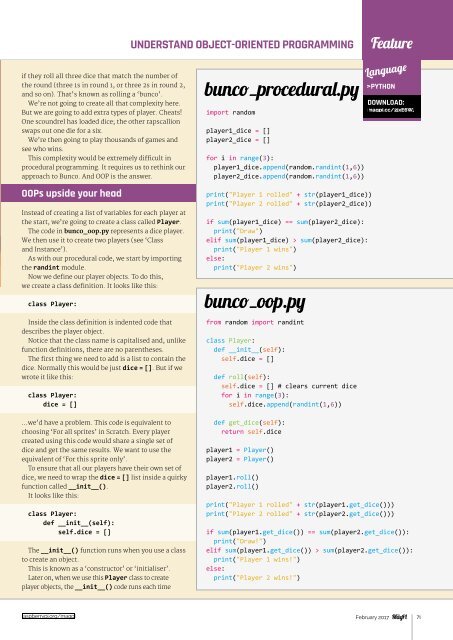-ORIENTED
MagPi54
MagPi54
You also want an ePaper? Increase the reach of your titles
YUMPU automatically turns print PDFs into web optimized ePapers that Google loves.
UNDERSTAND OBJECT-<strong>ORIENTED</strong> PROGRAMMING<br />
Feature<br />
if they roll all three dice that match the number of<br />
the round (three 1s in round 1, or three 2s in round 2,<br />
and so on). That’s known as rolling a ‘bunco’.<br />
We’re not going to create all that complexity here.<br />
But we are going to add extra types of player. Cheats!<br />
One scoundrel has loaded dice; the other rapscallion<br />
swaps out one die for a six.<br />
We’re then going to play thousands of games and<br />
see who wins.<br />
hi ompeity woud e etremey diut in<br />
procedural programming. It requires us to rethink our<br />
approach to Bunco. And OOP is the answer.<br />
OOPs upside your head<br />
Instead of creating a list of variables for each player at<br />
the start, we’re going to create a class called e.<br />
The code in bunco_oop.py represents a dice player.<br />
We then use it to create two players (see ‘Class<br />
and Instance’).<br />
As with our procedural code, we start by importing<br />
the ndn module.<br />
ow we define our pyer oet. o do thi<br />
we rete definition. t oo ie thi<br />
e<br />
nide the definition i indented ode tht<br />
describes the player object.<br />
Notice that the class name is capitalised and, unlike<br />
untion definition there re no prenthee.<br />
he firt thing we need to dd i it to ontin the<br />
dice. Normally this would be just dice = []. But if we<br />
wrote it like this:<br />
e<br />
de<br />
bunco_procedural.py<br />
import random<br />
player1_dice = []<br />
player2_dice = []<br />
for i in range(3):<br />
player1_dice.append(random.randint(1,6))<br />
player2_dice.append(random.randint(1,6))<br />
print("Player 1 rolled" + str(player1_dice))<br />
print("Player 2 rolled" + str(player2_dice))<br />
if sum(player1_dice) == sum(player2_dice):<br />
print("Draw")<br />
elif sum(player1_dice) > sum(player2_dice):<br />
print("Player 1 wins")<br />
else:<br />
print("Player 2 wins")<br />
bunco_oop.py<br />
from random import randint<br />
class Player:<br />
def __init__(self):<br />
self.dice = []<br />
def roll(self):<br />
self.dice = [] # clears current dice<br />
for i in range(3):<br />
self.dice.append(randint(1,6))<br />
Language<br />
>PYTHON<br />
DOWNLOAD:<br />
magpi.cc/2jxE6WJ<br />
wed hve proem. hi ode i euivent to<br />
hooing or prite in rth. very pyer<br />
created using this code would share a single set of<br />
dice and get the same results. We want to use the<br />
euivent o or thi prite ony.<br />
To ensure that all our players have their own set of<br />
dice, we need to wrap the dice = [] list inside a quirky<br />
function called __init__().<br />
It looks like this:<br />
e<br />
dene<br />
ede<br />
The __init__() function runs when you use a class<br />
to create an object.<br />
This is known as a ‘constructor’ or ‘initialiser’.<br />
Later on, when we use this e class to create<br />
player objects, the __init__() code runs each time<br />
def get_dice(self):<br />
return self.dice<br />
player1 = Player()<br />
player2 = Player()<br />
player1.roll()<br />
player2.roll()<br />
print("Player 1 rolled" + str(player1.get_dice()))<br />
print("Player 2 rolled" + str(player2.get_dice()))<br />
if sum(player1.get_dice()) == sum(player2.get_dice()):<br />
print("Draw!")<br />
elif sum(player1.get_dice()) > sum(player2.get_dice()):<br />
print("Player 1 wins!")<br />
else:<br />
print("Player 2 wins!")<br />
raspberrypi.org/magpi February 2017<br />
71


